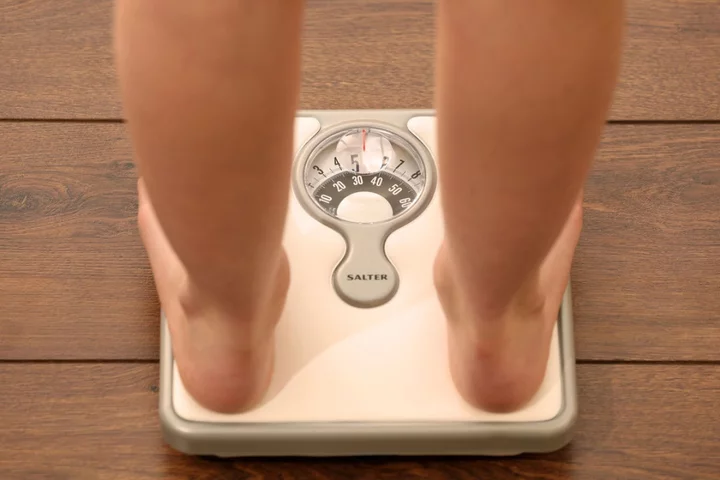
Being overweight ‘linked to 18 cancers’ in under-40s
Being overweight as a young adult can increase the risk of developing 18 cancers – more than have been previously linked with the disease, researchers found. Previous studies have shown that people who are overweight or obese have a heightened risk of a number of different cancers including breast, bowel, kidney and pancreatic. Now excess weight has also been linked to leukaemia, non-Hodgkin lymphoma, and among never-smokers, bladder and head and neck cancers in a large new study. The authors said these cancers have not previously been “considered as obesity-related cancers”. Our findings support public health strategies for cancer prevention focusing on preventing and reducing early overweight and obesity Study authors And that the impact of obesity on cancer is “likely underestimated”. The new study, published in Nature Communications, saw researchers examine data on more than 2.6 million Spanish adults aged 40 and under who were cancer-free in 2009. Researchers examined the body mass index (BMI) scores throughout the lifetime of people involved with the study, saying that previous research investigating the link between weight and cancer has used single BMI scores. The people in the study were tracked for nine years to see whether they developed cancer. Some 225,396 were diagnosed with cancer during the period studied. The Spanish researchers found that those who were overweight or obese in early adulthood – aged 40 and under – appeared to have an increased risk of cancer. Those who were overweight or obese for a longer period also appeared to have a higher risk. Our own evidence shows that maintaining a healthy weight throughout life is one of the most important things people can do to reduce their cancer risk, and early prevention in adulthood is key Dr Heinz Freisling, one of the study’s co-leaders Overall, some 18 cancers were linked to excess weight. The authors wrote: “This study shows that longer duration, greater degree, and younger age of onset of overweight and obesity during early adulthood are positively associated with risk of 18 cancers, including leukaemia, non-Hodgkin lymphoma, and among never-smokers, head and neck, and bladder cancers which are not yet considered as obesity-related cancers in the literature. “Our findings seem to indicate that longer exposures to overweight and obesity (with or without accounting for the degree of overweight and obesity), as well as developing overweight and obesity at younger ages in early adulthood might increase cancer risk. “Our findings support public health strategies for cancer prevention focusing on preventing and reducing early overweight and obesity.” Dr Heinz Freisling, from the International Agency for Research on Cancer and one of the study’s co-leaders, said: “The results of our study support a re-evaluation of the cancer burden associated with overweight and obesity, which currently is likely underestimated.” Commenting on the study, Dr Panagiota Mitrou, director of research, policy and innovation at World Cancer Research Fund, said: “This large study has future public health implications since additional cancers, such as leukaemia and non-Hodgkin lymphoma, have been shown to be linked with overweight and obesity. “Our own evidence shows that maintaining a healthy weight throughout life is one of the most important things people can do to reduce their cancer risk, and early prevention in adulthood is key.” Read More Study says drinking water from nearly half of US faucets contains potentially harmful chemicals Up to 10,000 Britons could take part in cancer vaccine trials People with signs of bowel cancer should be offered a £5 ‘poo test’ before invasive bowel investigations Nurture your health and wellbeing this season What diet drinks don’t have aspartame in them?
2023-07-06 13:20

How to go sober if your partner still drinks
Jennifer Lopez has come under fire for launching and promoting her new alcohol brand, due to her husband Ben Affleck’s problems with alcoholism. The 53-year-old Let’s Get Loud singer, who had previously told InStyle that she abstains from caffeine and alcohol, took to Instagram following the announcement of her new liquor brand Delola, saying she enjoyed the “occasional cocktail” but did not drink to excess. Fans had been quick to criticise her, posting comments like, ‘Why not respect your husband’s sobriety?’ Her husband Ben Affleck, 50, has been candid about his struggles with alcoholism. In a 2020 New York Times interview, he shared: “It took me a long time to fundamentally, deeply, without a hint of doubt, admit to myself that I am an alcoholic… The next drink will not be different.” Affleck is sober, but seemingly, Lopez is not. “Going sober can be really difficult, especially if your partner drinks. There may be aspects of your drinking which they enjoy, so it’s quite common for people close to you, to say things which make it harder to go sober,” says Dr David McLaughlan, a visiting consultant psychiatrist for the Priory. So, how can you do it if your partner isn’t so keen? Consider what you will gain “Going sober might mean less drunken fallouts or arguments about incidents which occurred under the influence of alcohol. Avoiding hangovers also gives you back a lot more quality time together and more free cash to spend on things that matter to you,” says McLaughlan. If more sex and higher fertility are important to you, quitting the booze may help, perhaps helping to garner support from your partner too. “You might also notice increased libido and erectile function when you quit drinking. Even small amounts of alcohol reduce your fertility, so giving up will also increase your chances of falling pregnant together,” he explains. Find the right time to discuss it It may be a sensitive topic to dive into. “It is important when you go sober, that you find a time when your partner is calm, collected and willing to discuss a big change in your relationship,” says Phil Jackman, an addiction therapist at private rehab clinic Delamere. “Attempting to speak to them when they are stressed or busy may lead to unnecessary conflict. “Once you’ve found the right time, be honest with your partner and let them know the reasons you are giving up alcohol, and how this might impact your relationship. Hopefully, they will be supportive of your decision, but there might need to be a few things you need to work through first. “If you are with a partner that still likes a drink, try asking them if they can remove any alcohol from the house, or from a place you have access to it, so you aren’t tempted to give up on your sobriety,” he says. Don’t make unfair demands of them “Though it is fair to ask your partner to stop drinking and support you in sobriety, it is important that this is not a strict expectation of them. Assuming someone will automatically change their lifestyle just to suit yours may cause unnecessary conflict,” Jackman says. “Instead, when you make the decision to go sober, it’s important that you sit and talk through the reasons why you want to give up drinking, so they fully understand your decision. You may find they want to improve their own personal relationship with alcohol. However, it’s important to note, not everyone will be willing to do so. ” Seek out authenticity One of you quitting drinking could break a dangerous cycle. “If you and your partner regularly drink, more than just socialising with friends or during an occasion, your relationship could develop with a co-dependency to alcohol, where you are drinking to maintain the relationship,” says Dr Stefan Walters, Caba’s addiction specialist. “As humans, we can be highly influenced by peer pressure and the people around us. So, if we are socialising with those who drink heavily, we may feel a judgement for being sober, or that we are not joining in on the fun,” he explains. Pushing past that dependency will help you be authentic with your partner. “When you are sober, your personality is authentic, and you will feel emotionally present throughout conversations and experiences with your partner,” Walters adds. Find new things to do together If one of you does not drink, you may have to think outside the box about things you can do together. “If you are still feeling this way about the activities or hobbies after some time, I’d recommend speaking openly with your partner about adjusting or changing them,” says Walters. “Generally, you may feel that you’d rather take up healthier hobbies, like physical pursuits or mentally stimulating activities, instead of those centred around drinking, like quizzes or socialising at the pub. “So, it’s not necessarily about how to enjoy the same things, but working out how to spend time together through new activities that you both enjoy and receive emotional fulfilment from,” he explains. Going sober could help you find something new you love to do together. Read More Charity boss speaks out over ‘traumatic’ encounter with royal aide Ukraine war’s heaviest fight rages in east - follow live Fiona Phillips Alzheimer’s diagnosis at 62: 7 ways to reduce your risk 7 popular destinations that will soon be in London’s ULEZ Kate’s best Wimbledon looks, as she steps out in retro outfit for the tennis
2023-07-05 20:49
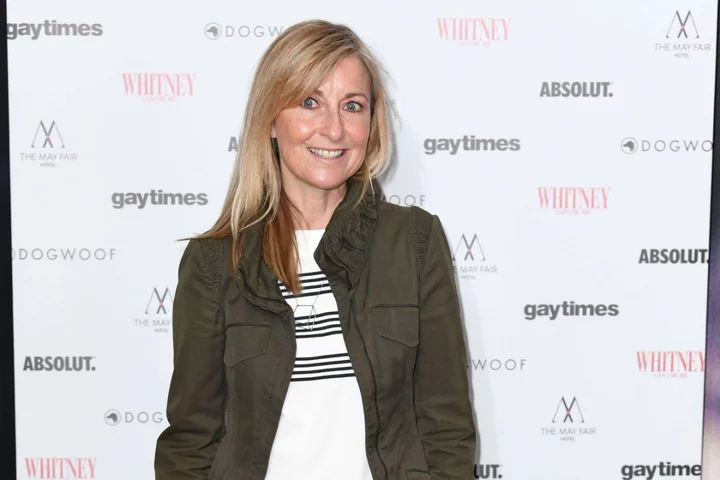
Fiona Phillips Alzheimer’s diagnosis at 62: 7 ways to reduce your risk
TV presenter Fiona Phillips has revealed she has been diagnosed with Alzheimer’s disease at the age of 62. The presenter and Daily Mirror columnist said the disease has “ravaged” her family and she had long feared being given the diagnosis. According to the Mirror, Phillips was diagnosed more than a year ago and is undergoing trials for a new drug that could slow the effects of the disease. Phillips, who is an Alzheimer’s Society ambassador, told the Mirror: “This disease has ravaged my family and now it has come for me. “And all over the country there are people of all different ages whose lives are being affected by it – it’s heartbreaking. “I just hope I can help find a cure which might make things better for others in the future.” As well as her column in the national newspaper, Phillips anchored GMTV for more than a decade from 1997. She also competed in the BBC’s Strictly Come Dancing in 2005. She is married to Martin Frizell, editor of ITV’s flagship programme Good Morning Britain. Phillips told the Mirror that, despite fearing she would one day be diagnosed with Alzheimer’s, the news was still a “gut-punching, shuddering shock”. The presenter said she feels “more angry than anything else” due to the disease having already affected her family life. “My poor mum was crippled with it, then my dad, my grandparents, my uncle. It just keeps coming back for us,” she said. Though she previously kept the news private, Phillips said she has decided to share her story to help end the stigma around Alzheimer’s. “There is still an issue with this disease that the public thinks of old people, bending over a stick, talking to themselves,” she said. “But I’m still here, getting out and about, meeting friends for coffee, going for dinner with Martin and walking every day.” She is taking part in clinical trials at University College Hospital in London, which aim to revolutionise future treatment. Hilary Evans, chief executive of Alzheimer’s Research UK, said: “We’re sending our love and support to Fiona and her family following her announcement that she’s living with Alzheimer’s disease. “Fiona’s been a friend of Alzheimer’s Research UK for well over a decade, and her support has shone such a valuable spotlight on the importance of research in overcoming the diseases that cause dementia. “There are around 70,800 people with dementia in the UK who, like Fiona, are under 65 and we’re determined to find a cure to end the heartbreak it causes.” It is thought at least five in every 100 people with Alzheimer’s are under 65. Though this figure may be higher, as it can be more difficult to get an accurate diagnosis at a younger age. So, is there anything you can actually do to help prevent dementia? 1. Stop drinking fizzy drinks Drinking too much coke or lemonade could increase your chances of developing dementia. People who consume the highest amounts of ultra-processed foods, like fizzy drinks and chocolate, may have a higher risk of developing dementia than those who eat the lowest amounts, a study by Huiping Li, of Tianjin Medical University in China, published in the Neurology journal, has indicated. 2. Say no to UPFs Sadly, lots of our go-to ingredients like sausages, ketchup and baked beans are highly processed, making them a risk-factor if consumed too frequently. Li, the author of the study, said: “These foods may also contain food additives, or molecules from packaging or produced during heating, all of which have been shown in other studies to have negative effects on thinking and memory skills. “Our research not only found that ultra-processed foods are associated with an increased risk of dementia, it found replacing them with healthy options may decrease dementia risk.” 3. Reduce your treats Too much chocolate and things like biscuits aren’t good for you, because they are highly processed and sugary. In fact, according to the study, for every 10% increase in daily intake of ultra-processed foods, people had a 25% higher risk of dementia. So, even just having a few extra biscuits or chocolates at work each day can heighten your risk. 4. Keep moving We all know being slumped at a desk, staring at a screen all day, isn’t great for your health, but it turns out sedentary jobs actually increase your risk of getting dementia. Dr Sara Imarisio, head of strategic initiatives at Alzheimer’s Research UK, said: “Our brains are incredibly complex, responsible for our memory, as well as what we think, feel and do. “Keeping our brains healthy as we age can help stave off diseases like Alzheimer’s, which physically attack brain cells, tearing away at the very essence of who we are. “We know that being physically and socially active can help us feel happier, healthier and more positive in general. “Lifting weights and running marathons aren’t for everyone, but there are many ways that we can stay physically active in our lives.” Noting more research published in the Neurology Journal, by Huan Song of Sichuan University in China, Imarisio continued: “This self-reported study adds to evidence that finding something you can stick to, that keeps you physically and socially active, is likely to have the greatest benefit to your health, rather than the activity itself. “The researchers found that even people with a high genetic risk for Alzheimer’s, the most common cause of dementia, could benefit from keeping physically active.” 5. Make an effort to see family and friends Social interaction is a really important way to keep your brain sharp and reduce your risk of dementia. If you avoid it, you are risking your health. According to Song’s research, people who were highly engaged in activity patterns, including frequent exercise and daily visits of family and friends, had 35% and 15% lower risk respectively, compared with people who were the least engaged. 6. Do the chores According to the same study, carrying out household chores is associated with a 21% reduced risk of dementia. Perhaps just increasing your brain activity a little, even just by washing up or changing your sheets, can help keep your mind active. 7. Play an instrument According to several studies, musicians are 64% less likely to develop mild cognitive impairment or dementia. So, if you’ve ever fancied playing the piano, guitar or ukulele, now’s the time – it’s never too late to learn something new. Read More Charity boss speaks out over ‘traumatic’ encounter with royal aide Ukraine war’s heaviest fight rages in east - follow live 7 popular destinations that will soon be in London’s ULEZ Kate’s best Wimbledon looks, as she steps out in retro outfit for the tennis How tennis could be harming your body – and why it does you good
2023-07-05 18:26

This is how Novak Djokovic is preparing to win Wimbledon
Tennis won Novak Djokovic over when he was just four years old. Since then, the Serbian professional tennis player established himself as a reigning men’s champion. In July 2006, he won his first Association of Tennis Professionals (ATP) event, and reached the semi-finals at Wimbledon and the French Open a year later. The 36-year-old also advanced to the finals of the US Open in 2007, but lost in straight sets to the former Swiss professional tennis player Roger Federer. He managed to win his first Grand Slam tournament at the Australian Open and was awarded a bronze medal at the 2008 Beijing Olympics. Though Djokovic’s performance has plateaued at some points, his hot streak has continued over the last 16 years. He claimed his 21st Grand Slam championship after winning Wimbledon in 2022 and gained his 10th title at the Australian Open, crowning both him and Rafael Nadal with the most Grand Slam men’s singles championships. With the 2023 Wimbledon Championships in full swing until July 16, how will Djokovic prepare himself both mentally and physically to win? Diet Djokovic starts his day with raw celery juice — which has anti-inflammatory properties – and sometimes drinks it before, during and after matches. Celery is about 90% water, so it’s great for hydration first thing in the day, especially when you don’t feel like chugging down a glass of water. On other occasions, he drinks the green goddess smoothie, “which is a load of green things chucked in and blended. In the food industry, you can get green goddess dressings, sauces and juices, which all have kale, spinach, peas, mint, cucumber, apple and spirulina powder all blended into one”, says celebrity private chef Ethan Russell. And for breakfast, Djokovic would normally eat a power bowl — it’s got a lot of healthy fats, grains, and fruit in it — or have it as a snack before exercising. The clear number one rule is being gluten and dairy-free. “It’s a choice many athletes make, especially if they want to feel and perform their best. Gluten and dairy can cause irritation,” Russell says. There are so many different dairy and protein alternatives at the moment, such as coconut, soy and almond. “The bowl has different types of grains, gluten-free granola — with pumpkin seeds and goji berries — then a low sugar style muesli,” he adds.“If you are an athlete and trying to keep your sugar low, you can opt for dairy-free yoghurt and manuka honey, which is quite expensive and very sought after, with its anti-inflammatory properties. People use it in food and skincare, making it a super food. The bowl is then topped with blueberries and strawberries, packed with natural sugars.” Warming-up Djokovic would usually start warming-up with his physiotherapist, then move onto to mobilisation and movement exercises, to minimise the risk of major injuries. Warm-ups can be anything from the running man, squat reaches to the sky and lunge rotations, all of which encourage great blood circulation. A match can last one and a half hours, and there are so many things to manage on match days, according to Mark Taylor, who coaches British tennis player Ryan Peniston and also works at the Junior Tennis Coaching academy. “They play all year round and often under immense pressure. It’s why I also work with a sports psychologist,” he says. Mindfulness Djokovic is heavily into mindfulness, and might begin his day with silent meditating — especially if he’s got an important game to focus on — in a grounded way, to promote mental clarity, calm focus and energy. “Most of us find it difficult to sit still,” says Loren Peta, yoga teacher and personal trainer. “But gentle movement and box breathing — where you draw a box with your mind’s eye to help you stay present — is a great way to transition from a state of doing to state of being.” Whilst in conversation with former Spanish tennis player Alex Corretja at the The House of ASCIS event last Friday, Djokovic opened up about his mental health and wellbeing. “If we are talking about mental strength and preparation, and how it affects performance, I feel like half of the work is already done before you step out on to the court – also known as the battlefield,” Djokovic said. “It’s why I try to only peak at the biggest tournaments and take more time than I used to, to get my mind and body into perfect harmony. My body is responding differently than it was 10 years ago, so I have to be more specific with my preparation, work, training and recovery. I believe in a holistic approach to this sport, and everything else in life. “It’s about everything you do, eat, the relationships around you, how you perceive yourself, the traumas and emotions that are suppressed in you. I know for me, if I suppress something, it will always surface on the court. The more you put these things aside, the bigger the monster will become. “If you fail to prepare, it’s going to be a difficult mountain to climb during the match. Tennis isn’t a sprint, it’s a marathon as well.” Getting the right footwear There are certain things that are important to keep in your kit. But for Djokovic, his racket and shoes are the two most important items for every tennis player, especially at his level. Good shoes adapt to the way a tennis player moves their feet, to ensure the right support and exact comfort can be added, if required. For example, improved extra heel cushioning and ankle support. “The details [are important],” said Djokovic. “Every single thing matters. How you move, how you feel with your racket and shoes. You need to be comfortable with what you are wearing, because it’s going to help you perform and move better. “I probably move differently to most of the guys out there – even on grass, I slide. [So I need] really flexible shoes that allow me to stop when I need to stop, and change directions when I need to change directions. It can’t be too light or too heavy.” Read More Charity boss speaks out over ‘traumatic’ encounter with royal aide Ukraine war’s heaviest fight rages in east - follow live Money-saving ways to garden on a budget 8 budget-friendly ways to juggle childcare and work during holidays Dior’s couture show was the epitome of quiet luxury
2023-07-04 16:58
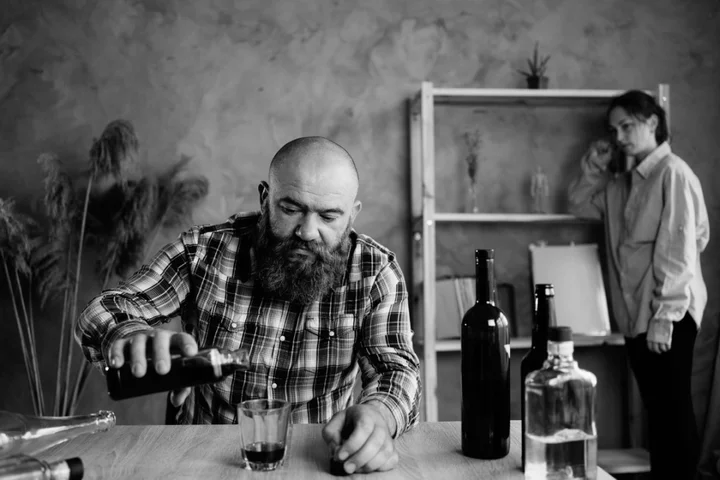
Affected by someone else’s drinking? 3 key pieces of advice for loved ones of alcoholics
Is there an alcoholic in your life? We don’t often talk about the people whose lives have been affected by someone else’s drinking – but the impact on loved ones, family and partners can be immense. For Alcohol Change UK – the charity behind Alcohol Awareness Week (July 3-9) – it is important that loved ones of alcoholics know they are not alone. According to a new survey commissioned by the charity – which is not anti-alcohol but working towards ‘alcohol change’ and to reduce the harm it causes – some 19% of drinkers consider alcohol to be an “essential” in their shopping basket, with 15% of people worried about the amount of alcohol someone in their household has been drinking. “Far too many lives are tragically cut short each year due to alcohol, with the latest figures on the number of alcohol-specific deaths at a record high. At the moment, 600,000 people in the UK could benefit from alcohol treatment but the vast majority are not receiving it,” said Andrew Misell, Director for Wales at Alcohol Change UK. “It can be heart-breaking to see someone close to you struggle with alcohol problems. But it is not only the drinker who is affected – their loved ones can feel the effects too. The pressures of caring for someone who is drinking heavily can be overwhelming,” Misell adds. “But by encouraging them to seek support, you can really improve their health and yours.” Is somebody close to you an alcoholic? Here are some key pieces of advice that may be helpful… Visit your GP Seeing your GP could help you address any anxiety you may be grappling with. They can offer professional and nuanced advice that will help you communicate how you really feel to a loved one who needs to stop drinking, and steer you towards your own mental health support if necessary. “Living with someone who is struggling with an alcohol problem can be exhausting. You will want to do the best you can for your loved one, but your relationship with them is bound to be strained. You may no longer feel able to trust them,” Misell said. “They may well be neglecting family duties, and their moods may swing erratically. It’s important you find some time and space for yourself and for your own concerns and interests.” Also, anyone is allowed to contact the GP or safeguarding anonymously if, for instance, there is a parent with alcoholism looking after young children. Reach out to family support services Whatever your relationship with the person with an alcohol problem, other people will have had, or be having, similar experiences. Connecting with them at one of the many family support services across the country can be really helpful. “It may be worth you seeking out support from a families’ organisation like Adfam or Al-Anon, where you’ll be able to connect with others who are in the same boat as you,” Misell said. Bottled Up, meanwhile, offers information and advice for family members living with someone who is alcohol-dependent. The founders of the organisation are a therapist and a psychologist who have direct experience with alcoholism. Al-Anon provides free meetings where the family and friends of alcoholics can listen to the shared experiences of those in a similar positions. Al-Anon also has a separate arm for children aged between 12-17 called Alateen, where teenagers can share their experiences and find support, while also learning about the nature of the illness. Think about the four aspects of their health Before sitting down to talk about what is going on with a family member who is drinking too much, it might be a good idea to be prepared about what you need to say. This could be a helpful step in deciding what actions to take in order to seek help, too. Dr Niall Campbell, Priory consultant psychiatrist and addictions expert, based at Priory Hospital in Roehampton, southwest London, suggests thinking about these four aspects of their health first: physical health, mental health, relationship health and their work health. “Are they falling over? Have they injured themselves? Have they been drinking to the point of amnesia? Blackouts? Are they hungover and sick in the morning? Have they gone to see their GP? Some results, such as high blood pressure, could be a good indicator,” Campbell said. “And then mentally, is it making them depressed? Are they irritable? Do they seem ashamed or guilty? Is their drinking adversely affecting relationships between a husband and wives, siblings, children, and parents? “When it comes to their work, are they missing it? Are they late going into the office and saying they can’t do their job properly because they’re drinking at home? This is a big problem since the lockdown.” He suggests doing this with a third party that’s already aware of the situation, so you can pull together more concrete examples. Read More Charity boss speaks out over ‘traumatic’ encounter with royal aide Ukraine war’s heaviest fight rages in east - follow live The history of royal fashion at Wimbledon How to be waterwise in your garden this summer Every Barbie-inspired outfit Margot Robbie has worn so far
2023-07-03 16:58

These high street iced coffees contain more sugar than Coca-Cola, Which? says
Some iced coffee drinks from high street chains can contain more sugar than a can of Coca-Cola, which contains 35g of sugar, a survey has found. Which? compared frappes and frappucinos from Caffe Nero, Costa and Starbucks to find many had “exceptionally high” amounts of sugar. A Starbucks caramel frappuccino with semi-skimmed milk was found to be one of the worst offenders, containing 48.5g of sugar – or 12 teaspoons’ worth. NHS health advice suggests adults consume a maximum of 30g of sugar per day, or around seven teaspoons. A Caffe Nero Belgian chocolate and hazelnut frappe creme contained 44.5g of sugar – equivalent to 11 teaspoons. At Costa, a chocolate fudge brownie frappe mocha with oat milk included 42.6g of sugar, or 10.5 teaspoons. Which? compared the amount of sugar in these drinks to a 51g Mars bar, which contains 31g of sugar (7.5 teaspoons), while a 330ml can of Coca-Cola contains 35g of sugar (around 8.5 teaspoons). Even plain coffee flavour frappes and frappuccinos were found to contain “relatively high” amounts of sugar. A Costa Coffee frappe with skimmed milk contained 21.3g of sugar, Which? found. While the calorie content of the drinks must be displayed in stores, the sugar content does not, which could leave consumers at risk of unwittingly exceeding the maximum recommended daily intake of free sugars, the watchdog said. Dairy-based drinks derive some “locked in” sugar from lactose, but all the drinks also contained high amounts of “free sugars”, which refers to sugars that have been added and contained in syrups, honey and fruit juice. Health advice is to limit consumption of these sugars due to their potential to contribute to weight gain and tooth damage. Which? suggested consumers wishing to cut their sugar intake switch to iced versions of a standard coffee instead. The government introduced a Soft Drinks Industry Levy (SDIL) in 2018, known as the “sugar tax”, in an attempt to cut unhealthy levels of consumption. However, some drinks are exempt from the tax, including fruit juices and drinks made on-site and served in open cups. Syrups, often used in frappes, are also exempt. Which? nutritionist Shefalee Loth said: “Our analysis of sugar content in iced coffee blends shows people could unwittingly be consuming much more sugar than they realise, with potentially damaging implications for their health. “High street chains need to take more responsibility and reduce the excessive sugar content of some of their drinks to protect people’s health. “When buying an iced drink, there are alternative, healthier options to choose, such as a standard iced coffee, which contains far less sugar.” A Starbucks spokesperson said: “We are committed to helping customers make informed and improved choices that work for them, offering a range of customisation options such as choosing our smallest size (Tall) and our oat dairy alternative with no added sugar. “Sugar content for an Iced Latte with Semi Skimmed Milk, one of our most popular beverages, starts from 8.7g for a Tall size. Customers can find all nutritional information available on our mobile app, online and our menu boards.” Caffe Nero described its Belgian chocolate and hazelnut frappe creme as a “treat” and said it accounted for less than 5 per cent of its sales of summer drinks, while “coffee over ice” drinks, which contained less than 8g of sugar, accounted for 50 per cent of summer drink sales. The chain added that its iced latte – its highest seller – contained no added sugar. Reporting by PA Read More Olivia Colman’s fight to end domestic abuse: ‘Women are still expendable’ Colleen Ballinger: Everything we know about the ‘grooming’ allegations against YouTuber Miranda Sings Kevin Costner’s estranged wife says she’ll move out of their $145m home on one condition Starbucks barista documents coffee chain’s alleged food waste in viral video Being lonely ‘may increase risk of heart disease in diabetes patients’ Sarcoma Awareness Month: What you need to know about these cancers
2023-07-01 13:15
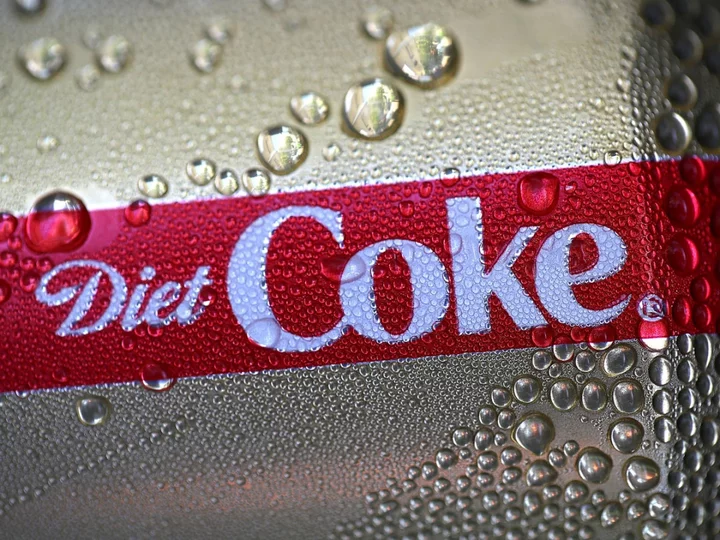
Diet Coke fanatics react to forthcoming WHO announcement on ‘possibly cancerous’ aspartame: ‘The final straw’
Fans of Diet Coke have reacted with despair at reports that the World Health Organisation (WHO) may catagorise aspartame – an artificial sweetener in the drink – a potential carcinogen. It was reported on Thursday (29 June) that the health organisation’s cancer research unit, the International Agency for Research on Cancer (IARC), is preparing to label aspartame as potentially cancerous from July. Aspartame is a low-calorie artificial sweetener that is approximately 200 times sweeter than sugar and is used in a huge number of soft drinks, including Diet Coke, Pepsi Max, Diet Irn Bru, and Sprite Zero, among others. It is also used in foods such as chewing gum, candy, breakfast cereal, frozen desserts and puddings, and gelatins. Although the IARC’s ruling on the sweetener remains confidential until July, Diet Coke fans are already wondering if they might have to give up their favourite fizzy drink. “If they interfere with Diet Coke it will be the final straw for me I’m afraid,” one person warned. Another joked they have already “drunk the Diet Coke equivalent of swimming at a superfund site” in their lifetime. “You can take away my Diet Coke when you pry it out of my cold dead hands,” a third mordantly added. “Listen, if you’re going to take away Diet Coke from us, you better be prepared for 72 per cent of women aged 25-45 to quit their jobs,” another person claimed. “That’s all I’m saying. *Cracks open third Diet Coke before noon*” Others appeared smug that they had never switched from regular full-fat Coke – which contains around 10.6g of sugar per 100ml, equating to 35g per 330ml can – to the low-sugar version. One person referred to a scene from hit series Friends that showed Chandler (Matthew Perry) shouting: “I knew it!” Another said: “I told you all that Diet Coke was just as bad as regular Coke.” The IARC is expected to make its decision over aspartame public on 14 July, the same day as the Joint WHO and Food and Agriculture Organisation’s Expert Committee on Food Additives (JECFA), which is also reviewing aspartame use this year. JECFA has said it is safe to consume aspartame within accepted daily limits since 1981. An adult weighing 60kg (132 pounds) would have to drink between 12 and 36 cans of diet soda every day to be at risk, a view widely shared by national regulators. The additives committee “conducts risk assessment, which determines the probability of a specific type of harm (eg., cancer) to occur under certain conditions and levels of exposure”. The review of aspartame comes after a study conducted by experts from the French National Institute for Health and Medical Research, and Sorbonne Paris Nord University, published on March 2022, claimed it could increase the risk of cancer in people who consume it. But previous large-scale studies on humans have not revealed similar associations. A separate study published last December found that aspartame was linked to anxiety in mice. The deputy chief scientific adviser of the UK’s Food Standards Agency, Rick Mumford, commented on reports and said: “Our view is that the safety of this sweetener has been evaluated by various Scientific Committees and it is considered safe at current permitted use levels. “The IARC report has not yet been published and, when it is, it will be examined by the JECFA, who will put together a risk assessment by the end of July. We will closely study JECFA’s report and decide whether any further actions are needed.” The Independent has contacted Coca-Cola for comment. Read More Walk this way... but not like that: How men’s walks became sexualised Colleen Ballinger: Everything we know about the ‘grooming’ allegations against YouTuber Miranda Sings Kevin Costner’s estranged wife says she’ll move out of their $145m home on one condition ‘My small rash turned out to be a parasite living in my leg after a beach trip’ Chrissy Teigen welcomes fourth child – how does surrogacy actually work? Heart disease digital check-ups for over 40s being rolled out
2023-06-29 23:50

Bre Tiesi reveals whether she’d have another child with Nick Cannon
Bre Tiesi has revealed whether she’d have another child with Nick Cannon, who is already the father of 12 children. The Selling Sunset star shared her thoughts about expanding her family during a recent interview with Entertainment Tonight. Tiesi has one child, Legendary Love, who she welcomed with Cannon in June 2022. According to Tiesi, she’s not sure if she wants to have another child, given how focused she’s been on her career. “I do and I don’t,” she said. “I think that for where I’m at in my career and my life right now, I just don’t know how I could possibly manage another child.” However, she went on to note that she’s not against the possibility of giving Legendary a younger brother or sister. “Part of me does want to give him another sibling, but he has a few of those, so I don’t think he’s necessarily missing out, but it’s hard. I don’t know,” she said, referring to her son’s many half siblings. In addition to Legendary, Cannon welcomed four other children in 2022 with different women. He welcomed his daughter, Onyx Ice Cole, with model LaNisha Cole in September, and his son, Rise Messiah, with Brittany Bell in October. Cannon and Bell also share a six-year-old son, Golden, and two-year-old daughter, Powerful Queen. In November, the comedian and Abby De La Rosa welcomed their daughter, Beautiful Zeppelin Cannon. This is the pair’s third child, as they also share two-year-old twins, Zion and Zillion. The Masked Singer host and Alyssa Scott welcomed their daughter, Halo Marie, in December, one year after their son, Zen, died from a rare brain tumour. In addition, the comedian shares his 12-year-old twins, Moroccan and Monroe, with ex-wife Mariah Carey. Speaking to Entertainment Tonight, Tiesi said that she’s spoken to Cannon about having more children and that he’s “open to whatever”. However, she echoed that if she “can’t do it a hundred per cent, I don’t want to do that”. The realtor also acknowledged that she’s still working on balancing her professional and personal life as a mother of one. “I don’t want to take more attention away from my son than I already do, working like I do, so I’m really trying to figure out how to manage that, and I think adding in another aspect of another human would be very hard,” she explained. Elsewhere in the interview, Tiesi spoke candidly about her unconventional relationship with Cannon, and praised him for being so involved in their child’s life. “So, here’s the thing that I know everyone wants to argue with me about - but he makes his own schedule,” she said. “He can show up every day, when he stops from work. He can come at night. So, he’s here every week, and especially when he’s home, he’s here.” She noted that while she and Cannon don’t have a “set schedule” or “plan things,” he’s still extremely “supportive” of her. “He’s very present and he’s at anything and everything I ask him to be at. So, I’m very happy. He’s very supportive,” she said. During an episode of Selling Sunset that aired last month, Tiesi described her relationship with Cannon as “open,” noting that her “situation is interesting” and that she wouldn’t say she’s “single”. “I don’t want to call it open, but open relationship, I guess. I just know we just had a baby, we’re really happy, so I’m happy in my relationship now,” she said. “I’m not a monogamy kind of person. Everything I’ve ever seen is divorce, and people are unhappy and it ends badly, and the kids suffer. Men can’t keep it together. It’s never us.” Read More Nick Cannon shares Mariah Carey’s ‘high frequency’ reaction to actor having 12 children Nick Cannon accused of misogyny over ‘pathetic’ Taylor Swift remark Nick Cannon forgets one of his children when asked to name all 12 How do I get a mammogram screening? Jonnie Irwin makes rare red carpet appearance as he says ‘every day is a gift’ Nicolas Cage fans praise actor for ‘sweet’ gesture to his son on a plane
2023-06-28 23:18

Jonnie Irwin makes rare red carpet appearance as he says ‘every day is a gift’
Jonnie Irwin has said that he “takes every day as a gift as it comes” amid his treatment for terminal cancer. The A Place in the Sun presenter, 49, made a rare red carpet appearance at the Television and Radio Industries Club (TRIC) Awards on Tuesday night (27 June) in London. Irwin also spoke about the support he has received from the BBC’s Escape To The Country production team and said they “put their arm around me” after he divulged his diagnosis. The TV host publicly revealed that he had been diagnosed with lung cancer that had spread to his brain in November 2022, after keeping it a secret among close friends and family for two years. He told The Mirror at the TRIC Awards: “Today is a good day. Yesterday I peeled myself out of bed and munched painkillers but so far so good today. I take every day as a gift and as it comes.” Irwin previously claimed that Channel 4 “pushed him aside for someone healthier” after discovering his terminal cancer diagnosis and told him they didn’t “think they can get the insurance”. He spoke of being “heartbroken” by the broadcaster, adding: “I just feel I’d earned a bit more from them after 18 years”. Channel 4 representatives said the production company “were unable to secure adequate insurance cover” for Irwin. However, Irwin had nothing but praise for Escape To The Country, which he described as “family” to him. “With a notable exception from one production company, as soon as they found out they put their arm around me and, insurance provided, they looked for work when I could,” he said. “So any location that was anywhere near me I was [the] first candidate for and they really helped me find work. They were understanding, especially with travel arrangements. They were so supportive, I can’t thank them enough.” Escape To The Country was nominated for the Daytime TV award at the event, alongside A Place in the Sun. The latter won the category at the end of the night. Prior to the winners being announced, Irwin described the production team as “family” and said the nomination was “recognition” for all their work. “I’ve worked on Escape for coming up to 10 years, but 20 years in the industry and I’ve had the most fun and it’s the most like a family of all the shows I’ve done,” he added. When he first revealed his diagnosis, Irwin said he “doesn’t know how long” he has left to live, but hopes he will inspire people to “make the most of every day”. Earlier this month, he celebrated his “best ever” Father’s Day with his three sons, four-and-a-half-year-old Rex and three-year-old twins Rafa and Cormac. He shares his children with wife Jessica Holmes. It came after he revealed in an interview with Hello! magazine ahead of Father’s Day that he has not told his sons about his terminal cancer, saying it would “be horrible news that they’d have to get their heads around”. “And it would confuse the hell out of Rex – he’s got a shocking enough day coming,” Irwin said. “Let’s bury our heads in the sand for as long as possible.” Read More Walk this way... but not like that: How men’s walks became sexualised Jennifer Lawrence addresses Liam Hemsworth affair rumours after Miley Cyrus’s ‘Flowers’ music video ‘I don’t deserve this’: Tom Hanks’ niece has screaming meltdown on Claim to Fame Jonnie Irwin celebrates ‘best Father’s Day ever’ amid terminal cancer diagnosis Jonnie Irwin ‘removes himself’ from family home amid terminal cancer battle Nicolas Cage once bought seat on plane for son’s imaginary friend, Minnie Driver says
2023-06-28 15:21
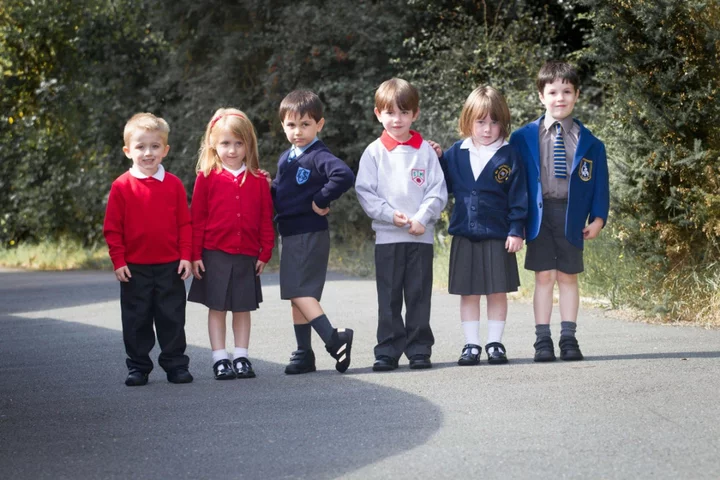
Hacks for saving money on school uniforms
Parents and carers of children in secondary school are still spending “exorbitant amounts” on school uniforms, a charity has said. According to research conducted by The Children’s Society, which surveyed 2,000 parents across the UK in May, on average they are spending £422 per year on uniforms and £287 for primary school children. The survey found that on average pupils were expected to have three branded items, with 29% of secondary school pupils expected to own up to five branded items including PE kits, and 13% expected to have at least seven. So how exactly can parents and carers save money on school uniforms? Buy secondhand Sometimes there’s a means to buy secondhand uniforms at the school through the Parent Teacher Association, Matthew Easter, chairman of The Schoolwear Association, says. But if this isn’t the case, he adds: “Parents should challenge schools and members of staff to provide better financial support to parents.” Parents can even ask the school to reach an agreement with their recommended retail partner, to help them save money. “Have a look on local Facebook sites or sometimes schools have secondhand sales themselves,” advises teacher, mother and money saving expert Sophie Bradbury. “Sometimes you can get uniform that’s barely been worn as someone’s grown out of it too quickly. If you know anyone with children in their older years, ask them. Chances are they’ve still got some old jumpers or polo shirts hanging around. “Also check out your local charity shops and make sure to ask if they have any uniform out the back. Charity shops don’t put everything out straight away, so it’s always worth an ask. [You can also try] car boot sales. I always see old uniforms going for pennies.” It’s great when siblings attend the same school too, because you can pass down their old items. Buy good quality uniform that lasts It’s tempting to buy cheap school uniforms, but for Easter suggests it’s better to focus on quality over quantity. Easter is a parent of two girls aged seven and 10, and understands the strain it can put on families. “School uniforms are unique pieces of clothing, because pupils wear it for at least 196 days every year. It hardly changes too and doesn’t get lost as much as parents think – it’s only a small proportion. So why not invest in quality branded clothing that will last your child for a few years? “It means you can focus on purchasing the quality staple branded items, including a blazer, jumper – depending on the school – and tie from recommended retailers and then get skirts, trousers, white shirts, shoes and anything else required from independent retailers or supermarkets on the high street.” In reality, Easter suggests parents end up spending more in a shorter space of time buying lower quality uniforms, because they might need to be replaced. Buy it big so you get more out of it Uniforms tend not to be a one-time cost: you’ll have to buy replacements whenever you child has a growth spurt and the garments no longer fit. An easy hack to minimising the amount of new uniforms you have to buy? Buy the items a bit too big, giving your child time to grow into it. Recycle or upcycle Clothing is one of the world’s most polluting industries, so don’t throw your uniform away. You can always donate them to organisations that upcycle and recycle school uniforms, such as the Re:Form scheme (run by Trutex), which sells pre-owned uniforms at reduced prices. Or organisations like Pickni Uniforms, founded by Croydon rapper Jords and his friend Jamahl Rowl, which collaborates with schools, community organisations, and social service agencies to provide free school uniforms to students from low economic backgrounds. Read More Charity boss speaks out over ‘traumatic’ encounter with royal aide Ukraine war’s heaviest fight rages in east - follow live King Charles and Queen Camilla surprise spa guests in bathrobes at eco-village Nearly 1.5m 18 and under referred for mental health support in 2022 – charity Holiday hygiene horrors: Summer health risks to avoid, from flying to hotels
2023-06-27 21:47
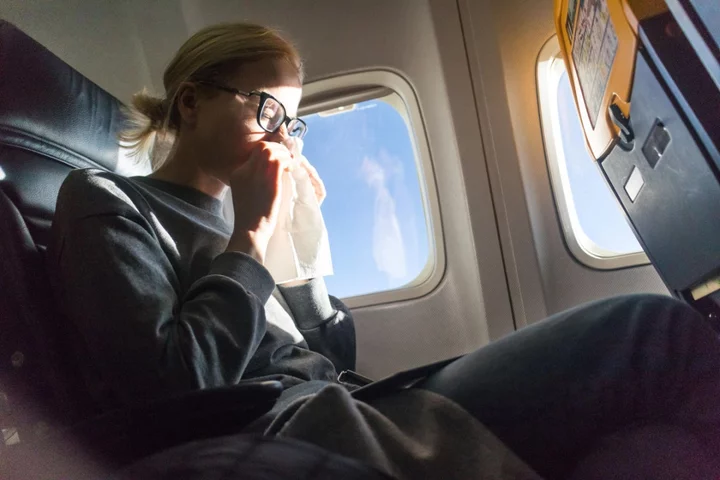
Holiday hygiene horrors: Summer health risks to avoid, from flying to hotels
Nobody likes getting sick, and illness on holiday is even worse – who wants to waste their precious vacation days lying in bed when they could be out having fun? Unfortunately, the chances of catching a bug can be high when you’re travelling. From airports and planes crammed with passengers to hotel rooms and restaurants with questionable cleanliness (even if it’s not visible to the naked eye), no wonder so many of us end up with the lurgy abroad. Here, health experts discuss the major health risks that occur on summer holidays and how to avoid them. Airports “Airports often become crowded and therefore they present multiple hygiene risks,” suggests Dr Donald Grant from The Independent Pharmacy. “Touching surfaces, using airport bathrooms and being in close proximity to others can cause bacteria to spread, so it’s important to be hygiene-alert.” Plus, having to hand your passport, boarding pass and luggage to different staff members increases the number of touchpoints throughout your journey. Dr Angela Rai, GP from the London General Practice recommends regularly washing your hands or applying hand sanitiser as you make your way through the airport. She says: “Washing your hands or using hand sanitiser helps reduce the risk of transmission of lots of different infections, including viral infections, coughs and colds and potentially gastrointestinal infections as well.” Flying “If someone is sitting next to you [on an airplane] and they have a cold, it may well be that you might catch one,” says Dr Preethi Daniel, deputy medical director at London Doctors Clinic. “There are hundreds of viruses that cause illness and the fact that you are mixing with people from all over the world means exposure to viruses and bugs your body may not be used to already.” It’s not only airborne bugs that you have to worry about, says Grant: “Again, it’s important to wash or sanitise your hands frequently during your flight, especially before eating or drinking, after using the bathroom, or if you’ve touched your armrest, tray table or TV screen.” As an extra precaution, you might also want to wipe down your down your table and armrests with an antibacterial wipe. Hotel rooms “While all hotel rooms should be thoroughly cleaned between each guest’s stay, you can never be fully sure that your room is bacteria-free,” says Grant. “To be on the safe side, take some disinfectant wipes and give the surfaces a good wipe down when you arrive — and don’t forget the TV remote, which may have been handled by hundreds of people without being cleaned.” Be extra careful with eating and drinking utensils in your room, he adds: “You should avoid using drinking glasses or mugs provided by the hotel without cleaning them thoroughly first.” Food and drink When eating and drinking at local spots abroad, Daniel’s advice is to “check for cleanliness even in established restaurants; paying particular attention to the state of tablecloths, cutlery, glasses and whether the tables are wiped down properly”. Look out for flies on food as well, she warns: “They are often loaded with pathogens as they do not discriminate between feeding on food or faeces. “E. coli, salmonella or shigella are some of the most common causes of gastrointestinal infections on holiday. “Hepatitis A and typhoid are other infections you can contract from contaminated food or water.” Never drink tap water unless you know it’s safe, and beware of tap water being used in food and drink prep. Rai says to be careful with ice as it might have been made with tap water and “things like salads and raw vegetables that have been washed in that water”. “Stick to peelable fruit,” Daniel adds. “Bananas, mangoes and the like are perfectly fine to eat. Avoid anything that has already been peeled, chopped and is waiting in handy takeaway sizes for you.” Swimwear and towels “Unpleasant odours and growth of bacteria are some of the risks of poor hygiene when it comes to swimwear and beach towels,” says Daniel. “They trap moisture”, which could leave you vulnerable to “getting infections such as bacterial vaginosis or thrush”. Grant says: “Be mindful that your towel is likely getting dirtier on holiday than it would be at home — especially if you’re taking it to the beach or the pool. You should change or wash your towel at least every other day.” And unless you’ve got a different swimsuit for every day of the holiday, you’ll need to give it a wash. “You’re meant to wash your swimwear after every time you wear it, because you have to treat it like your underwear,” says Rai. Haven’t got access to a washing machine on holiday? Rai says: “Just gently hand wash your swimwear every time you use it with warm soapy water then hang it up to dry.” Read More Charity boss speaks out over ‘traumatic’ encounter with royal aide Ukraine war’s heaviest fight rages in east - follow live Pretty garden plants you didn’t know you could eat Group B Strep: 8 things every parent should know Princess Diana’s ‘black sheep’ jumper predicted to sell at auction for up to £70,000
2023-06-27 16:49

Kourtney Kardashian and Travis Barker reveal the gender of their baby
Kourtney Kardashian and Travis Barker have revealed the gender of their new baby. Earlier this month, Kardashian, 44, announced that she and Barker are expecting their first child together. On Saturday 24 June, the couple – who tied the knot last May – posted a gender reveal video on Instagram, along with a caption of pink and blue hearts. Kardashian is seen sitting on Barker’s lap, alongside a drum kit on a stage. The Blink-182 drummer can be heard saying: “Is our pyro guy ready?” The Poosh founder replies: “I don’t know what’s happening, whatever you guys had planned…” Her sister Khloe Kardashian can apparently be heard saying: “Let’s get the party started – we’re all excited!” Barker, 47, then begins a drum roll which ends with a burst of blue streamers, as the couple’s family and friends celebrate the news that they’re having a baby boy. “I love how they dont even look at anyone else when they’re together,” one fan reacted to the video. Referencing Kardashian and Barker’s couple name, another wrote: “They can actually name [the baby] Kravis.” Kardashian first shared the news she and Barker, 47, are expecting with a Blink-182-style pregnancy reveal video. In it, the mother of three can be seen holding up a sign that reads “Travis I’m pregnant”, recreating a scene from one of the band’s hit songs “All the Small Things”. While the video was widely celebrated on Instagram, some people suggested it was “staged” since Kardashian’s baby bump was apparently visible in it. Fans defended the reality star at the time, claiming it didn’t matter when Barker found out, and that the point of the video was simply to share the news with their followers. Earlier this week, Kardashian shared pictures of her growing baby bump, as some users speculated about her due date. Kardashian and Barker tied the knot after years of being friends, and celebrated their marriage with three wedding ceremonies – including one officiated by an Elvis impersonator in Las Vegas. Since then, the couple has documented parts of Kardashian’s experience with fertility treatments on her family’s reality series The Kardashians. In an episode last April, she also addressed how “every single person on social media is always like, ‘Kourtney’s pregnant, Kourtney’s pregnant, Kourtney’s gained so much weight” while she was undergoing IVF treatments. She told her mother Kris Jenner: “I’m like, it’s so rude to comment on people when you have no idea what they’re actually going through.” At the time, she also explained how the medication “basically put me into a depression”. Kardashian shares three children with her former partner Scott Disick. Meanwhile, Barker shares two children with his ex-wife and former Miss USA, Shanna Moakler. Read More Mother shares heartbreak after inviting whole school class to daughter’s birthday party Lewis Capaldi opens up about worsening Tourette’s tics while he’s on stage Gongs, chanting and Celtic Shamanism: What I learnt from a day at the Glastonbury Healing Field Prince Harry ‘wanted to interview Vladimir Putin and Donald Trump about childhood trauma’ How Center Parcs became a symbol of class
2023-06-25 19:29
